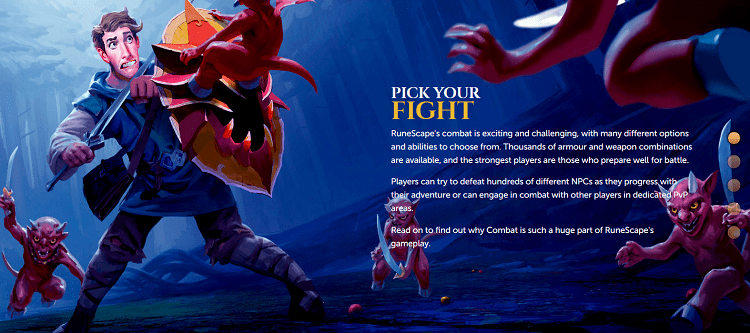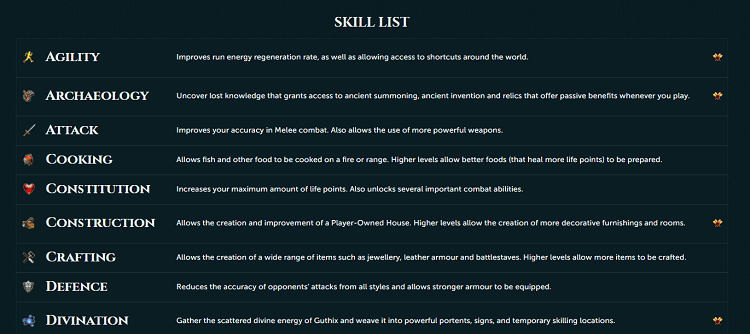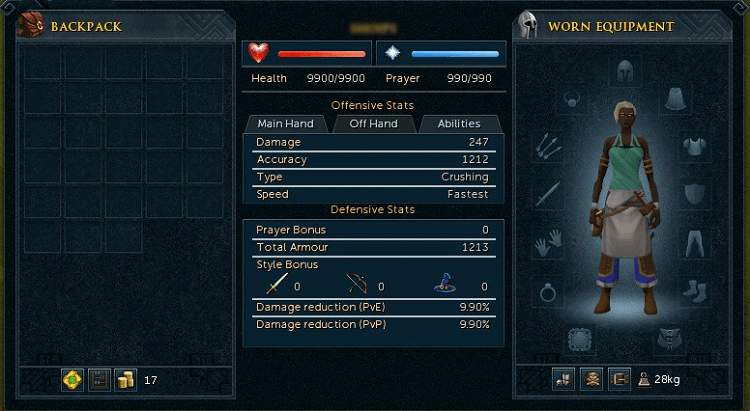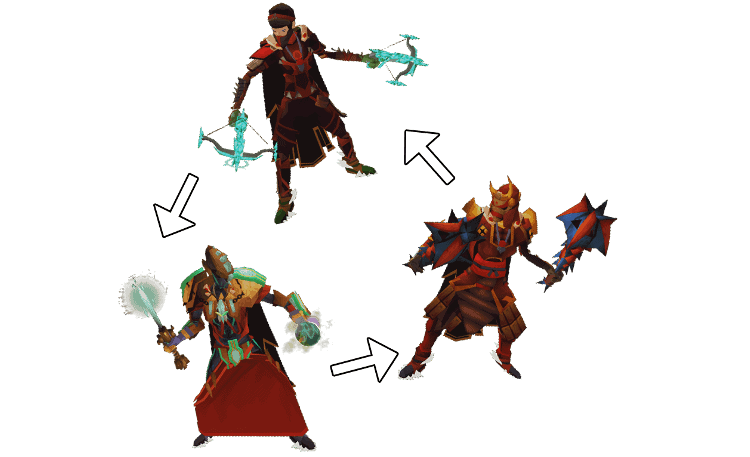The combat is based on randomly generated numbers in the form of “damage”, which eliminates the life points of the target. The damage done by the parties involved is determined by their abilities and, in the case of the player, their equipment among other things.
There is also a hit and block chance, the chances that the team will get a successful strike. The fighting continued until one person was killed or fled.
Players can influence their performance in battle in many ways, such as enhancing their fighting skills in pots or pans or reducing their enemy numbers with curses or curses. There are also other items that offer special buffs to combat.
Fighting Triangle, Representing Three Classes of War
There are three ways a player or beast can fight in battle: by a melee attack, various attacks, or magical attacks.
The sections involved in this attack are known as the hero, the guard, and the mage. The player category is determined by their outdated equipment and priorities, and thus their class can change as desired.
Each stage of the fight is strong against one stage and weak in the other. This creates a combat triangle, a symbol of this relationship.
The Warriors are strong compared to the guards. Ranger projectiles do not fit snugly into metal clothes, but warrior blades cut the skin easily.
Ranger is powerful compared to mages. Their leather jackets and dragonhide absorb magical spells, and their projectiles easily pierce the soft cloth of the maggot’s clothes.
Mages are strong when fighting heroes. The metal on the heroes’ robes makes spells. Their magic costumes are resistant to melee attacks, and they can be used to bind or catch spells to keep soldiers out of the invasion range.
By bringing weapons and armor to many combat classes, and by switching between them at will, a player can use many fighting styles in battle. This is called “hybridizing”.
Hybridding is often used to benefit from combat battles, especially to avoid defensive prayers that break the damage of a single combat style, and is a common practice in big multiplayer battles like Clan Wars.
The monsters use attacks from one or more combat stages, and most of them have weaknesses against a particular stage. Some monsters have no weaknesses and will probably fight successfully at any stage.
Fighting Skills

Level-fighting skills with players and creatures influencing their combat training. There are offensive and defensive skills that increase injury, chance to strike, and block chances, while there are other skills that enhance others or offer additional options in battle.
Accuracy Skills
These skills contribute to the accuracy of the player’s rule, giving up to 1212 basic accuracy at level 99.
- This attack raises your accuracy with melee attacks.
- Magic raises your accuracy by attacking magic.
- Ranged raises your accuracy with various attacks.
- Damage Skills These skills contribute to the player’s damage law. Damage gained scales with the speed of weapons and delivery, although basic, each level contributes 2.5 injuries.
- The power-ups your damage with a melee attack.
- Magic raises your damage with magical attacks.
- Ranged raises your damage with various attacks.
- As seen above, a skilled melee fight requires two skill training and each Ranged and Magic require only one. As a result, however, melee combat uses Attack skills and powers.
Other Skills
These skills are used by all levels of combat.
- The defense increases your chances of preventing enemy attacks and reduces the damage from detected attacks. At level 99, the Defense provides 1212 basic weapons and a 9.9% reduction in damage to animals and creatures.
- The Constitution raises your 100 life points for each grade. Players start at level 10 in this skill. At Level 99, the Constitution provides for 9900 basic points.
- Prayer is used to give buffs a fight, such as enhancing your fighting skills, and offers benefits like object protection, damage to death, and even the ability to minimize damage with a fighting style. The use of prayer eliminates points of prayer. The high level of prayer allows access to powerful buffs and benefits.
- Calling is used to convert partners to help. Many families will fight alongside you, while others serve as a beast of burden, or they will heal you and put your belongings among many other features. Like prayer, leading family members need to use a higher level of calling. Some families are intended to support non-military skills, making Calling a skill used in and out of the war.
While creatures have life points and a few rare things that use prayers or call for families, creatures do not have a constitution, a prayer, or a standard of calling.
Player versus Player (PvP)
Player combat compared to Player, also known as Player Killing or PKing, is an act of two or more players fighting each other. Fighting PvP requires a different approach to fighting PvM, as opponents have full access to the skills book and are more likely to be injured than most monsters.
Fighting with other players is forbidden in the wilderness and in small games. Some PvP locations, such as Wilderness and Crucible, are dangerous, meaning that everything is lost to death for the conqueror to plunder.
Some minigames like Castle Wars are safe, allowing players to reload without losing their belongings.
Duel Arena is an individual PvP combat arena. It allows the player to set limits on the duel, such as not allowing food or prayers and can be used for safe and secure duels.
Fighting Training
The feeling of fighting with a melee player going to Power.
When a player defeats a monster, a number of experience points are awarded based on its life points, difficulty fighting, and damage caused by the player. The experience gained at each point of life is not permanent: to put it bluntly, monsters with a high degree of instinct to combat instinct.
Players can change which combat skills they gain experience with Settings -> Gameplay. Then click Combat -> Combat XP, or Skills -> Experience, both are the same.
The experience gained by each stage of the fight can be incorporated into its related, or defensive skills, or divided between them. An additional 33% of all combat experience gained is incorporated into the capacity of the Constitution.
Balancing combat skills is often done by training Slayer skills. With faster experience levels, or if they defer a single skill, players can kill monsters close to their level and become weak in a trained combat style.
Level of Combat
The level of business resistance represents how difficult it is to win, calculated using its skill levels; many managers, however, have an assigned level that accurately reflects their risk.
The combat level of the business can be seen by right-clicking, even if non-combatants and heavier weapons will show off their total skills instead.
The player starts after creating an account as a level 3 combat; the highest level one can achieve is the level of combat of 138.
Skills Development

Players can increase their fighting skills in a number of ways, starting with exercises and prayers, both enhancing the player’s accuracy skills, injury skills, or defensive skills.
Potions temporarily increase the skill levels seen on the skill tab, additional levels decrease each minute, and prayers keep an invisible, continuous increase until you become paralyzed. The strongest fighting ingredients are unchanged and, like prayers, require a high level of Herblore to get.
The constitution cannot be amplified, but the player can increase their life points by equipping high-level weapons, throwing logs into a fire pit, or using the Fortitude prayer.
To treat more than the high point of life, one can eat Sadadomin poisons or certain foods such as cocktails and selfish, immerse yourself in a hot tub at Oo’glog spa, pray at the Elidinis Statuette in Nardah, or use scrolls calling for a titanium constitution.
Players can recapture prayer points beyond size by praying on special altars such as the Senate altar, by placing a brimstone spring at the Oo’glog spa, or by holding Gothic butterflies. Gothic butterflies can also increase a player’s call points beyond their normal length, as does Clan Battlefield’s strength tile.
Prayer and Calling Levels can only be increased using advanced pulse cores.
Not only can fighting skills be enhanced, but they can be enlightened by other creatures, bosses, and places like the snow north of Trollheim. Skills trenches can be fought by taking the medicine of recovery.
As enhanced skills, enlightened skills will return to their previous levels at a rate of 1 minute.
Changing Fights
Athlete life points, adrenaline, prayer points, and call points in the action bar.
There are many variations in the battle that measure business performance. Life points have players and enemies, and some methods are used on enemies slightly or with restrictions.
Life points – This represents how much damage a player or creature can withstand. When a business loses all its livelihood, it dies. Points for the full life of an athlete are determined by the level of their Constitution and their worn-out clothing. The main way to earn a living is to eat.
Adrenaline – This determines the skills a player or creature can use. Adrenaline is available and lost through a variety of skills, and unlike other methods, it is represented as a percentage. Only a handful of enemies can use adrenaline.
Prayer points – These are highlighted with the money spent on prayers. Some enemies may use prayers, even if only the players pay at the places of prayer, their high points are determined by their level of Prayer. The points of prayer can be fulfilled by praying at the altar, or by taking the prayer tree.
Call points – This is used to call a normal item, and it is turned on during normal storage. The player’s call rate is their highest call point, and these points are updated by drawing power from an obelisk or a small obelisk. A very small number of enemies can call family members.
When playing in Legacy combat mode, the adrenaline levels are changed by special attack power, which is found in the combat settings tab. Special attack power is used for special attacks and regenerates naturally.
Fighting Equipment

While skills are developed, a lot of the player’s fighting ability comes from their weapons and weapons-making, and in addition to jewelry that offers additional bonuses. Using good equipment is essential to fighting.
Weapons
Weapons are held in large and hand-held areas and contribute significantly to player injuries and accuracy, and determine the speed of the attack.
A warrior may fight with swords, swords, spears, mounds, spears, and other weapons; a striker can shoot from a short bow, a shield-bearer, and arrows, or throw weapons such as knives or arrows; and the mage can throw from a wand, orb, book, or stick.
The guard uses a shotgun to shoot arrows and crossbow bolts, though this is not required for missiles. The mage needs runes on its list to spread spells.
Players can carry a large handgun and a simultaneous weapon, known as a two-way weapon, or they can use a two-handed weapon that sits in both positions.
Either method provides an equal output of the injury. Alternatively, the player can fight a large weapon and shield, sacrificing the effect of the injury in order to defend himself.
Armor

Weapons increase the player’s chances of blocking and minimize their damage. It is worn on the head, chest, legs, gloves, boots, and Cape facilities. The hero wears heavy weapons made of iron; the guard wears elaborate costumes made of animal skins, while the mage wears magical costumes.
Weapons protect each stage of combat as determined by the combat triangle; this may appear on the Loadout screen as a Style Bonus, added to or removed from the Player Weapons Act.
Weapons that do not match the combat element of a player’s weapon will penalize accuracy, this is evident by focusing on the law of human accuracy.
Thus, each stage of the war requires its own weapons. Another option is hybrid clothing, which has no weaknesses and will not penalize accuracy under any style.
While a complete set of armor must be worn regularly in battle, the player can also arm the shield, which provides continuous protection and allows the use of shield skills.
Most weapons only serve to defend themselves; however, some weapons offer a self-defense offering to the damage of the bonus, while other sets are designed for use by all military classes.
Jewelry
Jewelry is worn around the neck and in the rings and enhances the athlete’s ability to fight, often as a blow or a prayer bonus. Most jewelry is limited to one class of combat, although some items benefit all classes and can be used by any.
Some jewelry has special effects: For example, a demon-horn necklace restores prayer points to all buried bones, and fortune-tellers gradually increase the chances of the decline of rare objects. Some items have non-combat benefits such as an amulet of glory, which can send a player to the map.
The Capes share the same function as jewelry or are counted as weapons.
Power
Skills are unique moves a player can perform in battle, which can do more damage, counteract opponents, defend and use buffs or debuffs. They are the key to combating damage. A player’s adrenaline determines what skills a player can use.
Each combat class has its own skills: some with some amazing basic skills, while others like Snipe or Decimate are different in their class. In addition, there are Defense and Constitutional related skills that can be used at any stage.
Power consumption depends on player combat mode. With the Complete Manual, each skill must be done manually; with Revolution, basic skills automatically start according to their placement in the action bar.
In Legacy Mode, a game setup that restores combat before Evolution of Combat, all abilities are disabled with special attacks in their place.
The power of each skill is located on the power screen and can be dragged to the interface. Once there, skills can be clicked to use them, or they can be dragged to the action bar and activated by pressing a locked key.
Buffs and Debuffs
Several skills leave a temporary effect on the player or target, persist for a while, and perhaps change their fighting ability. Examples are a Debilitate that cuts damage received from a target, or a Fragmentation Shot that causes overtime damage.
These effects are known as buffs or debuffs and are used with many skills. The player can see their own through the interface, and check out their enemy through its combat overlay, under their life points bar.
Buffs and debuffs are not only used for skills: any change in the performance of a fighting business with such calculations. The most common speakers for players are the rise of skills from prayers and supplications.
Special Attacks
Special attacks with unique skills gained through the use of certain weapons. They are achieved as a key skill in the Constitution set out, and unlike other skills, each special attack requires its own adrenaline level and draws that total amount when used.
Other special attacks have great potentials, such as the Saradomin Godsword, which restores user life points and prayer points, and Statius’s Warhammer, which draws 30% of the target’s protection.
In Legacy Mode, special attacks use special attack power instead of adrenaline. Percentage of energy required and illuminated activities in the same way.
Player versus Monster (PvM)
Fighting a player compared to Monster is an act of a player fighting a non-playing character. Fighting and killing monsters is often done to collect their drops, such as hiding bones from chromatic monsters, or collecting combat experience.
Slayer skill includes given the amount of beast to kill and is a standard PvM combat method. Some monsters that require the Slayer asleep to kill can discard important items.
At higher levels, players can take on bosses, which are powerful monsters with great survival and defense points that do great damage and are challenging to combat. Some bosses like Queen Black Dragon and Araxxor fight each other, while other bosses like Vorago need a team of talented players to win. Managers may discard the desirable items commonly traded on the Grand Exchange for gold.
FAQs
Question: How does combat work in RS3?
Answer: For the rating of a player’s combat abilities, see Combat level. Combat is an event in RuneScape in which two or more players and/or creatures fight.
Combat is based around randomly generated numbers in the form of “damage”, which depletes a target’s life points. … Combat lasts until one participant is killed or flees.
Question: How long does it take to get 99 combat RS3?
Answer: Levels 90–99 will take a few days. There are several good ways to achieve 99 but the fastest is to complete the Fight Cauldron Minigame.
Question: How do I change my attack type in RS3?
Answer: You have to go into Combat Settings. On the right, you’ll see Melee, Ranged, and Magic Combat Experience. Go to Melee and switch attack to defense.
Conclusion
In the end, I would like to say that I hope it helps you to reach 99 in all fighting skills as it has helped me and I hope that it can help you achieve Max Cape.
At the time of writing this guide, all the details were up to date and all my information is updated regularly to keep up with the latest RuneScape updates.
More helpful links with RS3 Combat Guides:
https://runescape.fandom.com/wiki/Pay-to-play_melee_training
https://guides.gamepressure.com/runescape3/guide.asp?ID=21592
- Zalcano OSRS Guide: Slaying The Imprisoned Demon - September 30, 2021
- Birdhouse OSRS Guide: What’s The Bird on The Street? - September 30, 2021
- Shield of Arrav OSRS Guide: Foiling a Grand Heist - September 30, 2021

